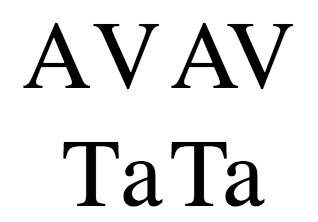The font-kerning CSS property sets the use of the kerning information stored in a font.
Kerning defines how letters are spaced. In well-kerned fonts, this feature makes character spacing more uniform and pleasant to read than it would otherwise be.
In the image below, for instance, the examples on the left do not use kerning, while the ones on the right do:

Syntax
font-kerning: auto; font-kerning: normal; font-kerning: none; /* Global values */ font-kerning: inherit; font-kerning: initial; font-kerning: revert; font-kerning: revert-layer; font-kerning: unset;
Values
auto-
The browser determines whether font kerning should be used or not. For example, some browsers will disable kerning on small fonts, since applying it could harm the readability of text.
normal-
Font kerning information stored in the font must be applied.
none-
Font kerning information stored in the font is disabled.
Formal definition
| Initial value | auto |
|---|---|
| Applies to | all elements and text |
| Inherited | yes |
| Computed value | as specified |
| Animation type | discrete |
Formal syntax
auto | normal | none
Examples
Enabling and disabling kerning
HTML
<div id="kern"></div> <div id="nokern"></div> <textarea id="input">AV T. ij</textarea>
CSS
div {
font-size: 2rem;
font-family: serif;
}
#nokern {
font-kerning: none;
}
#kern {
font-kerning: normal;
}
JavaScript
const input = document.getElementById("input");
const kern = document.getElementById("kern");
const nokern = document.getElementById("nokern");
input.addEventListener("keyup", () => {
kern.textContent = input.value; /* Update content */
nokern.textContent = input.value;
});
kern.textContent = input.value; /* Initialize content */
nokern.textContent = input.value;